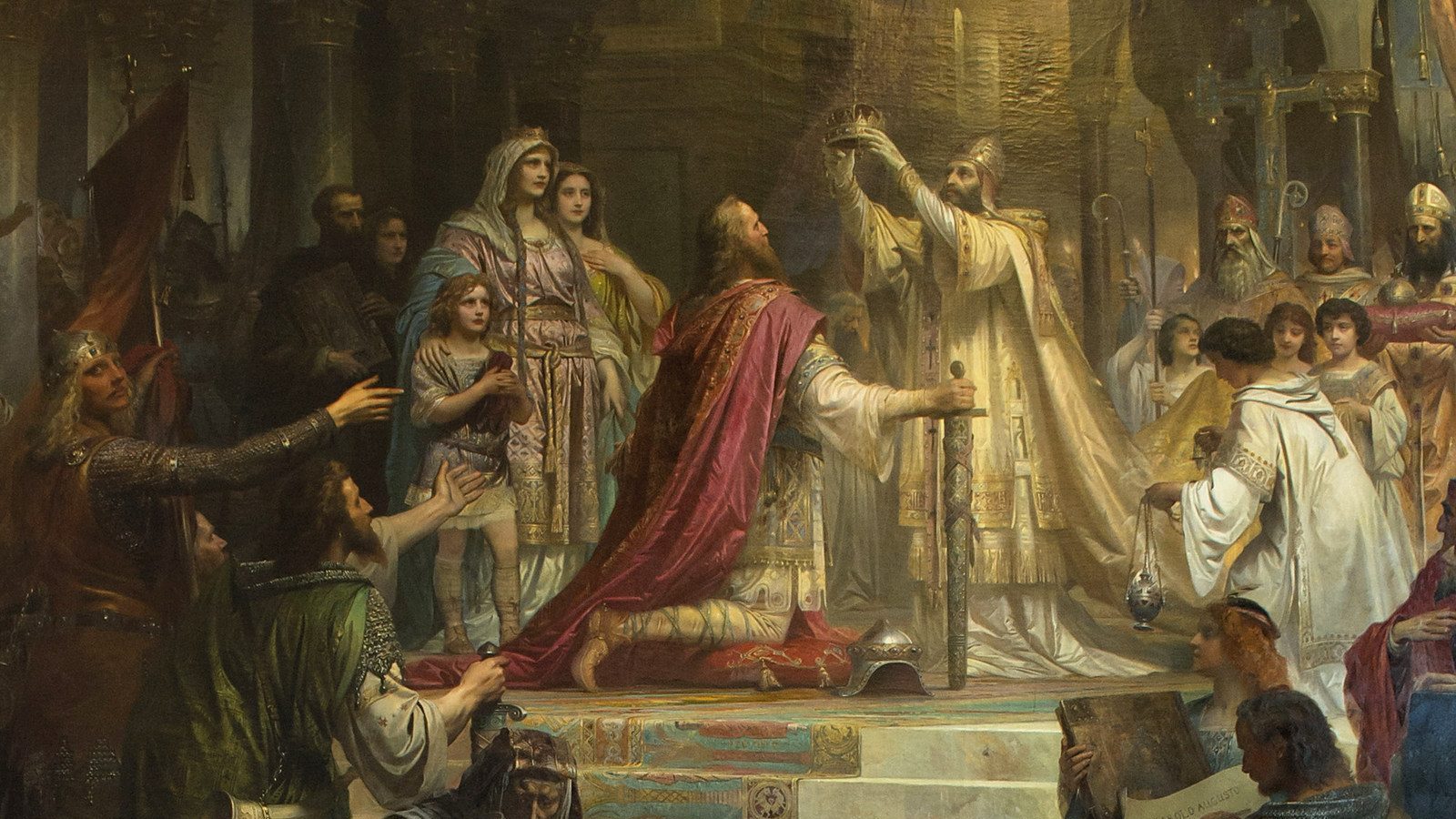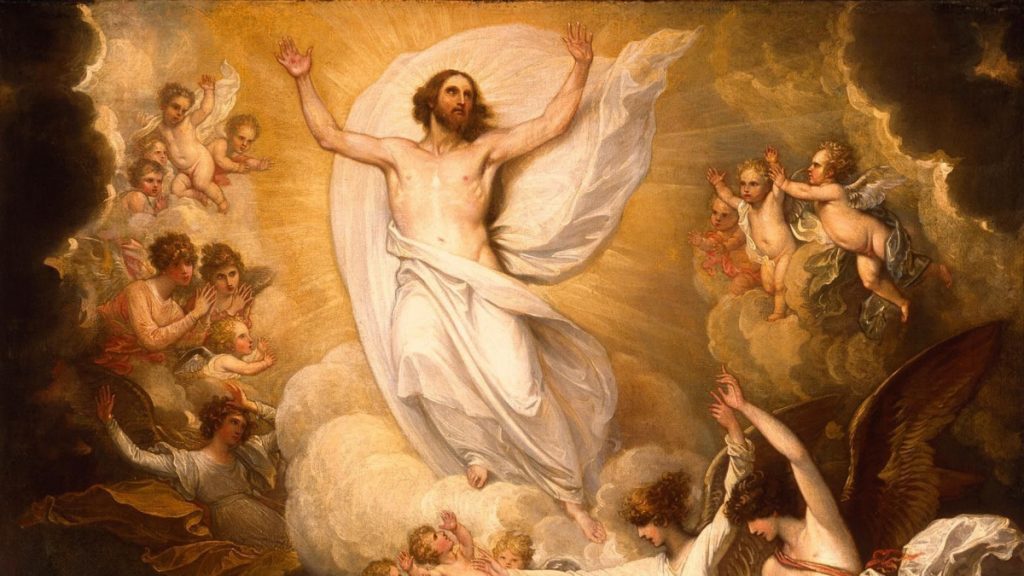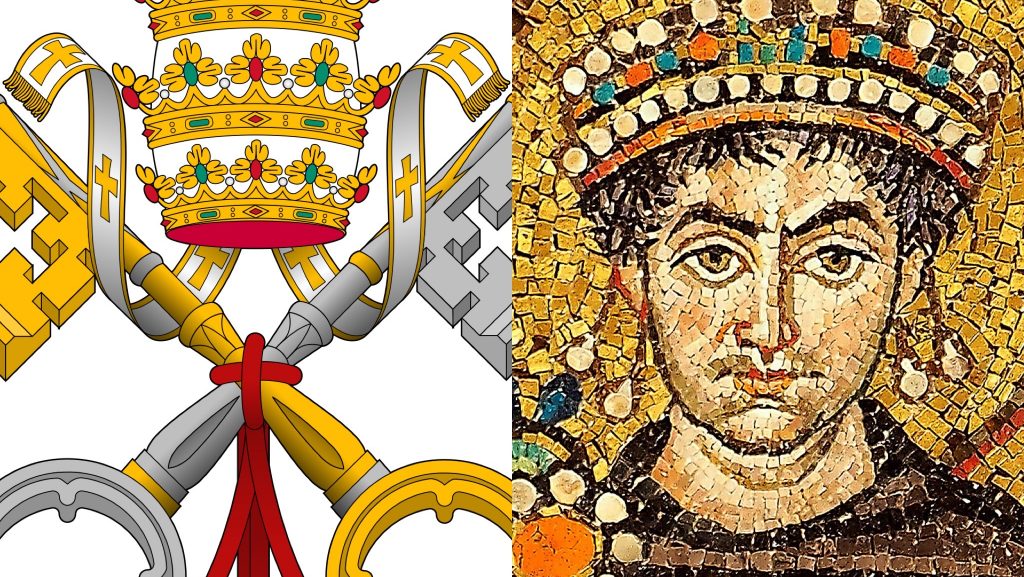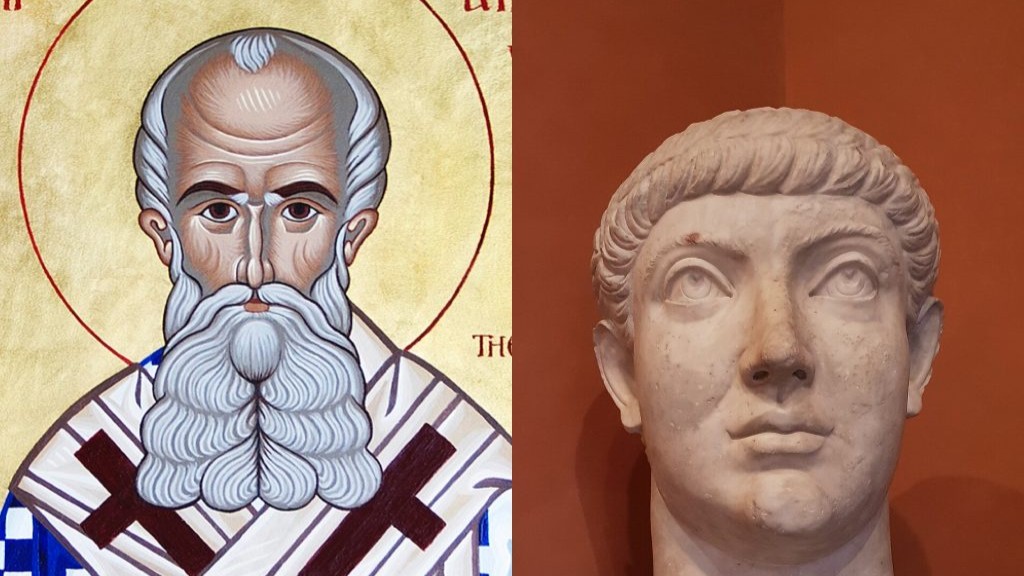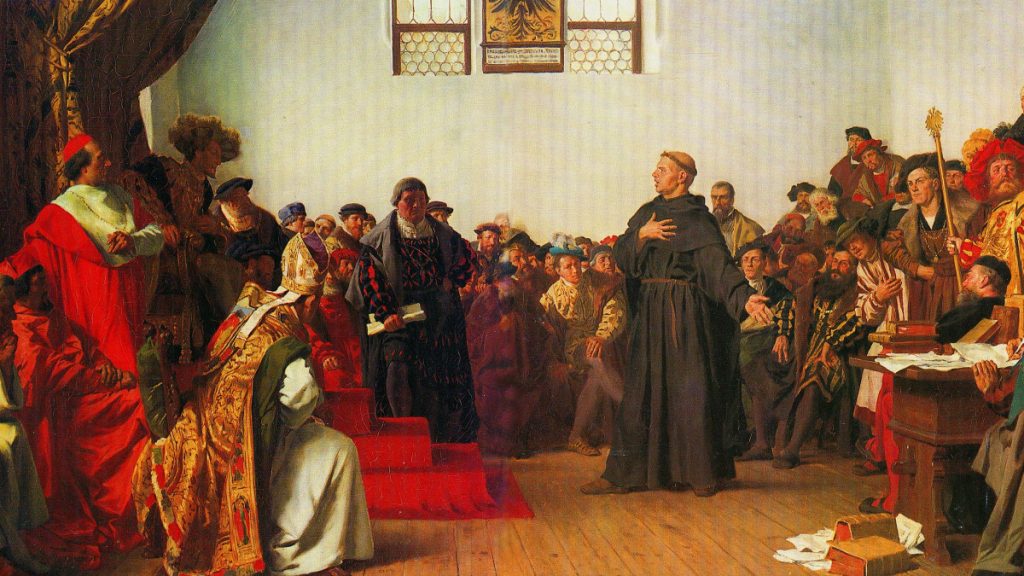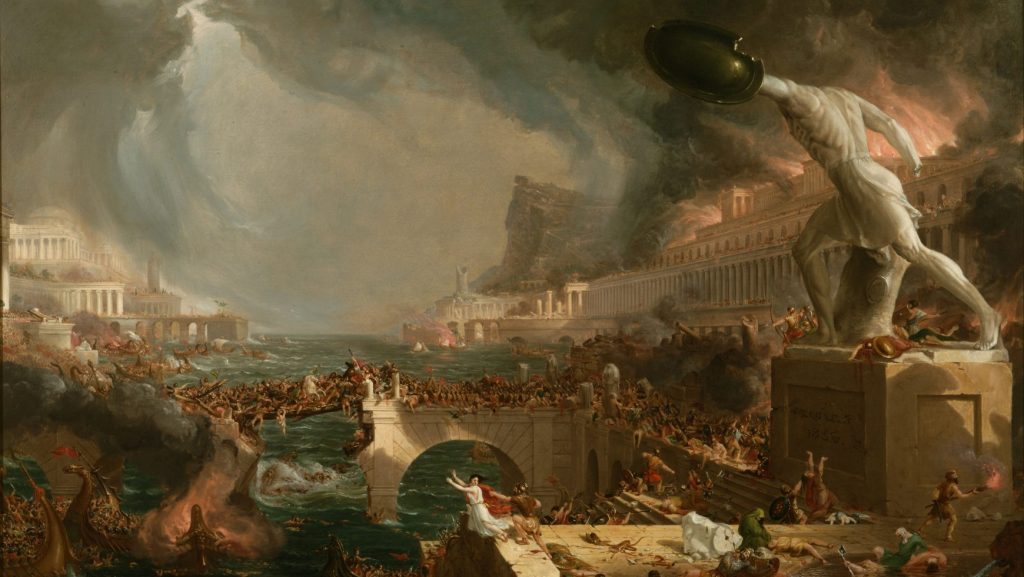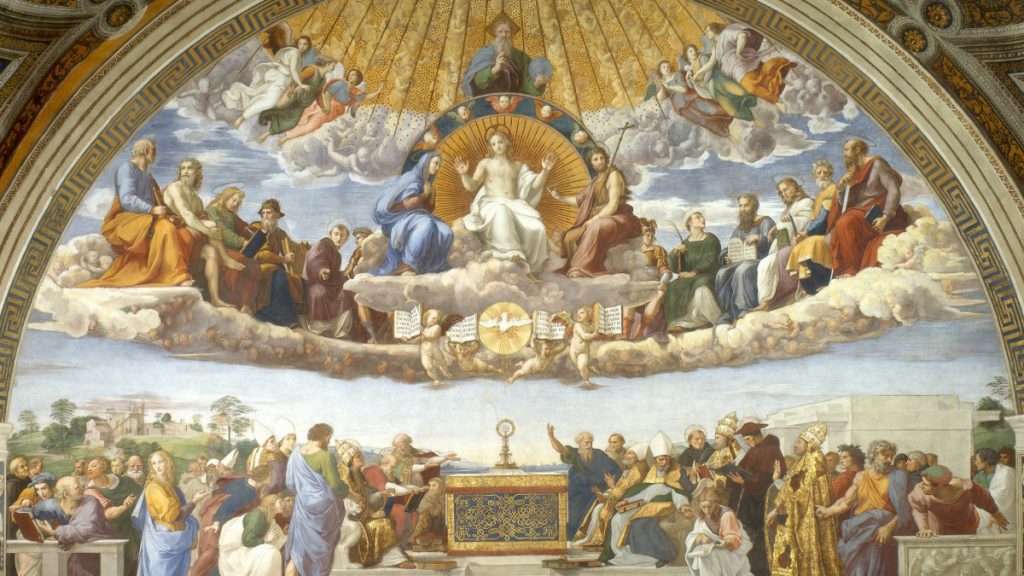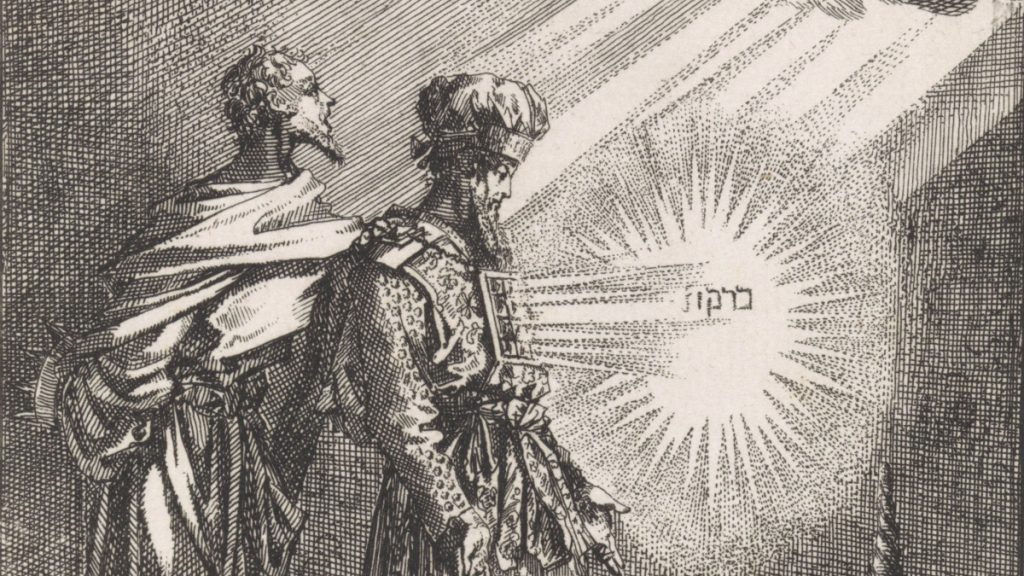(Updated September 5, 2025)
This is a Topic Quote Archive focused on Christendom: The Spiritual and Temporal Powers, and the Conversion of the Empire. The Spiritual Power is the Catholic priesthood, the Temporal Power is secular rulers (initially and primarily, the Emperors), and this Quote Archive covers their proper relationship within Christendom, as well as how the Roman Empire was converted to the Catholic Faith, and thereafter became the center of Christendom.
Each Author and/or Document Type name is hyperlinked to their respective Author/Document Quote Archive.
This Quote Archive is being continuously updated as research continues.
Eunapius of Sardis (c. 347-c. 420) | PAGAN
Eunapius of Sardis, Lives of the Philosophers
The Conversion of Alexandria from Paganism to the Catholic Faith1
Now, not long after, an unmistakable sign was given that there was in him some diviner element. For no sooner had he left the world of men than the cult of the temples in Alexandria and at the shrine of Serapis was scattered to the winds, and not only the ceremonies of the cult but the buildings as well, and everything happened as in the myths of the poets when the Giants gained the upper hand. The temples at Canobus also suffered the same fate in the reign of Theodosius, when Theophilus [bishop of Alexandria] presided over the abominable ones like a sort of Eurymedon “Who ruled over the proud Giants”2 421 | 423 and Evagrius was prefect of the city and Romanus in command of the legions of Egypt. For these men, girding themselves in their wrath against our sacred places as though against stones and stone-masons, made a raid on the temples, and though they could not allege even a rumor of war to justify them, they demolished the temple of Serapis and made war against the temple offerings, whereby they won a victory without meeting a foe or fighting a battle. In this fashion they fought so strenuously against the statues and votive offerings that they not only conquered but stole them as well, and their only military tactics were to ensure that the thief should escape detection. Only the floor of the temple of Serapis they did not take, simply because of the weight of the stones which were not easy to move from their place. Then these warlike and honorable men, after they had thrown everything into confusion and disorder and had thrust out hands, unstained indeed by blood but not pure from greed, boasted that they had overcome the gods, and reckoned their sacrilege and impiety a thing to glory in.
Next, into the sacred places they [the Christians] imported monks, as they called them, who were men in appearance but led the lives of swine, and openly did and allowed countless unspeakable crimes. But this they accounted piety, to show contempt for things divine. For in those days, every man who wore a black robe and consented to behave in unseemly fashion in public, possessed the power of a tyrant, to such a pitch of virtue had the human race advanced! All this however I have described in my Universal 423 | 425 History. They settled these monks at Canobus also, and thus they fettered the human race to the worship of slaves, and those not even honest slaves, instead of the true gods. For they collected the bones and skulls of criminals [martyrs], men whom the law courts of the city had condemned to punishment, made them out to be gods, haunted their sepulchers, and thought that they became better by defiling themselves at their graves. “Martyrs” the dead men were called, and “ministers” of a sort, and “ambassadors” from the gods to carry men’s prayers—these slaves in vilest servitude, who had been consumed by stripes and carried on their phantom forms the scars of their villainy. However these are the gods that earth produces!
St. Pope Celestine I (c. 376-432) | WEST
St. Pope Celestine, Letter 19: To Emperor Theodosius II (431)3
May the concern showed by your clemency suffice for the defense of the Catholic faith, which out of love for Christ our God, who directs your reign, you hasten to support in every way. By condemning the error of perverse doctrines you keep the faith pure and immaculate; in this you place the protection of your reign, knowing that your rule when protected by the observance of holy religion, will endure more firmly. But in virtue of episcopal office, each of us as far as he is able devotes his labor to the glory of this heavenly responsibility, and we are present at the council [of Ephesus] you have ordered in those whom we send, while we entreat your piety, as we appeal to the divine judgment, that your mildness should not give any scope to unruly novelty, and that no opportunity should be given to those who endeavor to restrict the authority of divine majesty within the limits of human debate–which would upset the peace of the church. The cause of the faith ought to be more important to you than that of your rule, and your clemency ought to be more concerned about the peace of the churches than about the security of all your territories. For success in everything else will follow if priority is given to preserving the things of God, as being still more dear. Abraham flourished through faith and 204 | 205 filled the whole world with the fame of his success; Moses, the liberator of his people, armed himself with zeal for the Lord against those who had departed form the true worship of God; and the Lord protected King David by subjecting his enemies to him, because in his reign he upheld the Lord’s commandments. Fortified by these examples, uphold by faith, vigilance, and power the universal church’s most pious worship of our God, lest dissension arrogate anything to itself. For your rule is assisted by every labor undergone on behalf of the peace of the church and the respect due to holy religion.
St. Pope Gelasius I (died 496) | WEST
St. Pope Gelasius, Letter 12: To Emperor Anastasius Augustus (494)
(§§2-3)4
(§2) …In fact, august Emperor, there are two ways in which this world is chiefly ruled: the hallowed authority [auctoritas] of the pontiffs (pontificum) and royal power [potestas]. In these two the responsibility of the bishops (sacerdotum) is so much greater, to the extent that at the time of divine judgment they will render an account even for the very rulers of human beings. Indeed, my most indulgent son, you must know that you are permitted to superintend through high office of a human kind; however, in your devotedness you bow your head to the leaders (praesulibus) of divine affairs, and from them you await the occasions for your salvation, and, in both taking the heavenly sacraments and being suitably disposed to them, you acknowledge that you must be subject to the order of religion, rather than be in control of it. And so in these affairs you depend on their judgment, and do not wish them to be reduced to your will. For if, as much as pertains to the order of public discipline, by acknowledging that the imperial rule has been conferred on you by heavenly dispensation, the overseers (antistites) of religion themselves also obey your laws, lest their opinions which are extrinsic to worldly affairs be regarded as standing in opposition to them, with what willingness, I entreat you, is it fitting that you obey those who have been assigned to the most excellent and venerable mysteries? Accordingly, just as a charge of no light weight presses upon the pontiffs to remain silent because of the worship of the Divinity, as is proper, so there is no middling danger for those (heaven forbid!) who despise those whom they should obey. And if, in general, when all the bishops are administering divine affairs properly, it is appropriate for the hearts of the faithful to be subject to them, how much more should agreement with the leader of that see [Rome] be adhered to, whom the most high Divinity willed to be preeminent among all the bishops, and the loyalty of the entire church has honored continually?
(§3) Wherever Your Piety turns a clear gaze, never has anybody been able to raise himself by any completely human counsel to the privilege or acknowledgement of that one whom the voice of Christ set before all [Peter], whom the venerable church has always acknowledged and in her 74 | 75 devotedness holds as primate. The ordinances established by divine judgment can be assailed by acts of human presumption, but they cannot be overcome by the power of any of them.
St. John of Damascus (c. 675/76-749) | EAST
St. John of Damascus, Treatise 1: Defense Against Those Who Attack the Holy Images
(§66)5
Since many priests and emperors have been endowed with wisdom that comes to Christians from above, from God, and have been distinguished for their piety, their doctrine, and their lives, and many synods of holy and divinely inspired fathers have taken place, why does no one attempt to explain these things? We shall not suffer a new faith to be taught. “For a law has come out from Sion,” the Holy Spirit declares in prophecy, “and the word of the Lord from Jerusalem” (Isa. 2:3). We shall not suffer different things to be thought at different times, changing with the seasons, and the faith to become a matter of ridicule and jest to outsiders. We shall not suffer the custom of the fathers to be subject to an imperial constitution that seeks to overthrow ecclesiastical laws. For this is not the way of the fathers; for it is piratical for these things to be imposed by force, and they shall not prevail…These things are matters for synods, not emperors, as the Lord said, “Where two or three are gathered together in my name, there I am in the midst of them” (Matt. 18:20). It was not to emperors that Christ gave the authority to bind and loose, but to apostles and to those who succeeded them as shepherds and teachers.
St. Bruno of Cologne (c. 1030-1101) | WEST
St. Bruno of Cologne, Commentary on 2 Thessalonians6
If he [Antichrist] would come into the world now, when the majority of people obey the Roman pontiff and when Christian kings thus far preserve the faith, he would have a beast to mount that was not ready, and he would not be able to proceed on his way. When there is such a discessio, the faith will survive on the throne of Peter, even if only in a few. For the saints are said to have obtained the prayer of Christ when he said to Peter, “I have prayed for you, Peter, that your faith may not fail” (Luke 22:32)… 199 | 201
Just this restrains Antichrist, that who now holds the Christian empire and the unity of the faith may hold this for so long, until iniquity, which is now secret, may be taken from among the midst, that is from among the community, that just as now faith is in public (in communi) and iniquity in secret, so in the time of Antichrist faith may be in secret and iniquity in public, since his members will blush no more at acts of impurity than acts of purity, and those who have faith will be few.
St. Thomas Becket (1119/20-1170) | WEST
St. Thomas Becket, Letter to King Henry II (1166)7
For your sake for three causes: because you are my lord, because you are my king, and because you are my spiritual son. In that you are my lord I owe and offer to you my counsel and service, such as a bishop owes to his lord according to the honor of God and the holy church. And in that you are my king I am bound to you in reverence and regard. In that you are my son I am bound by reason of my office to chasten and correct you…
Christ founded the Church and purchased her liberty with His blood, undergoing the scourging and splitting, the nails, and the anguish of death, leaving us an example that we should follow in His steps. Whence also saith the apostle, “If we suffer with Him we shall also reign with Him. If we die with Him, with Him we shall rise again” (2 Tim. 2:12).
The Church of God consists of two orders, clergy and people. Among the clergy are apostles, apostolic men, bishops, and other doctors of the Church, to whom is committed the care and governance of the Church, who have to perform ecclesiastical business, that the whole may redound to the saving of souls. Whence also it was said to Peter, and in Peter to the other rulers of the Church, not kings nor to princes, “Thou art Peter, and upon this rock will I build my Church, and the gates of hell shall not prevail against it” (Matt. 16:18).
Among the people are kings, princes, dukes, earls, and other powers, who perform secular business, that the whole may conduce to the peace and unity of the Church. And since it is certain that kings receive their power from the Church, not she from them but from Christ, so, if I may speak with your pardon, you have not the power to give rules to bishops, nor to absolve or excommunicate anyone…
Let my lord, therefore, if it pleases him, listen to the counsel of his subject, to the warnings of his bishop, and to the chastisement of his father…
It is known almost to the whole world with what devotion you formerly received our lord the Pope and what attachment you showed the Church of Rome, and also what respect and deference were shown you in return. Forbear then, my lord, if you value your soul, to deprive that Church of her rights. Remember also the promise which you made, and which you placed in writing on the altar at Westminster when you were consecrated and anointed king by my predecessor, of preserving to the Church her liberty…
We are ready faithfully and devotedly with all our strength to serve you as our dearest lord and king with all our strength in whatsoever we are able, saving the honor of God and of the Roman Church, and saving our order [the clergy]. Otherwise, know for certain that you shall feel the divine severity and vengeance.
Footnotes
- Philostratus and Eunapius, Wilmer Cave Wright, trans., Philostratus and Eunapius: The Lives of the Sophists (London: William Heinemann Ltd., 1952), 421, 423, 425. ↩︎
- Homer, Odyssey (Book 7, §59). ↩︎
- Richard Price, trans., Translated Texts for Historians, Vol. 72: The Council of Ephesus of 431, Documents and Proceedings (Liverpool: Liverpool University Press, 2022), 204-205. ↩︎
- St. Pope Gelasius I, Bronwen Neil and Pauline Allen, trans., The Letters of Gelasius I (492-496): Pastor and Micro-Manager of the Church of Rome (Turnhout, Belgium: Brepols Publishers, 2014), 74-75. ↩︎
- St. John of Damascus, Andrew Louth, trans., Popular Patristics Series, Vol. 24: St. John of Damascus, Three Treatises on the Divine Images (Crestwood, NY: St. Vladimir’s Seminary Press, 2003), 57. ↩︎
- Kevin L. Hughes, Constructing Antichrist: Paul, Biblical Commentary, and the Development of Doctrine in the Early Middle Ages (Washington, DC: The Catholic University of America Press, 2005), 199, 201. Quoting from PL 153.419A and PL 153.420A. ↩︎
- James Bruce Ross and Mary Martin McLaughlin, eds., The Portable Medieval Reader (New York: Penguin Books, 1977), 249-50. ↩︎
